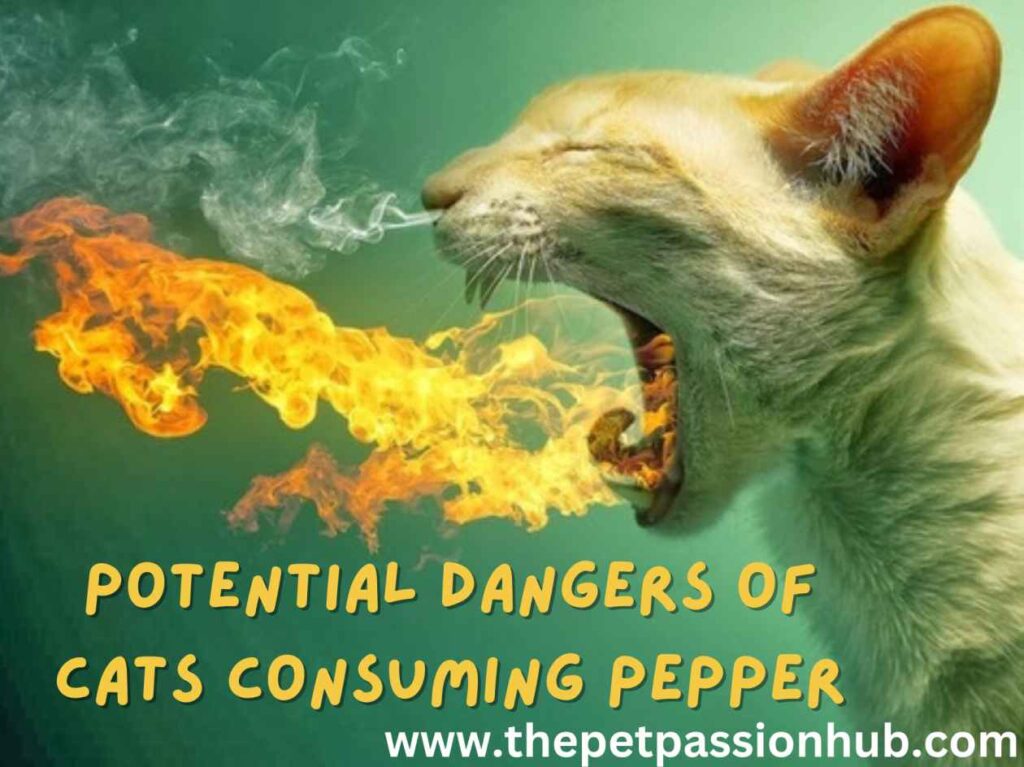Introduction
Have you ever accidentally spilled pepper and watched in disbelief as your feline friend curiously sniffed. Then lapped it up with a twinkle in their eyes?
This peculiar phenomenon leaves many cat owners scratching their heads in confusion.
Welcome to the intriguing world of ‘Cats Eating Pepper’. It’s an enigma that has puzzled cat enthusiasts and veterinarians alike.
Unraveling the Mystery of Cats and Pepper
Are you ever intrigued by the peculiar habits of your feline friend? One mystery worth unraveling is: why do cats exhibit such strange reactions to pepper?
You’ve probably stumbled upon various videos showcasing bizarre behaviors cats display when they come across this common kitchen spice.
Pepper – while a tasteful additive in human dishes – can pose significant risks to our beloved pets. Unlocking the realm of feline dietary health, we discover that feeding pepper to cats. That may lead to gastrointestinal discomfort, confusion, and even serious respiratory distress.
Does your cat seem excited by the smell or taste of this spicy condiment? Before giving in to her curiosity, ensure you familiarize yourself with the dangers. That associated with your fur-baby’s consumption of spicy delights!
Discover how safer alternatives can satisfy their adventurous palate without jeopardizing their health.
Understanding Cats’ Sensory Responses

While it’s commonly known that cats are notorious for their nimble agility and sharp reflexes. Not everyone is wholly aware of the intricacies governing their sensory responses.
The processing powers at play within their brain spheres work in complex tandem. To interpret myriad day-to-day stimuli, spanning gustatory sense – or taste – to olfaction – or smell.
Your cat’s palate isn’t just meant to savor tuna and chicken; it plays a vital role in alerting dangers too! It becomes all more crucial when we broach topics like, ‘can cats eat spicy food? or aim at discerning ‘what foods are harmful for cats?’
Imagine your feline friend biting into pepper-loaded food. Spice and heat aren’t what they naturally lean into gastronomically–their organs wouldn’t react kindly.
It can lead to symptoms ranging from gastrointestinal upset to toxicity depending on the ingredients involved. Hence, understanding your cat’s sensory responses indeed forms the bedrock of its wellbeing.
Can Dogs Eat Dove Meat? Benefits and Risks of This Popular Meat
The Science Behind Cat’s Aversion to Pepper
Diving deeper into the science behind a cat’s distaste for pepper, it becomes evident that it all boils down to their remarkably heightened sensory receptivity.
Unlike humans, cats have an especially refined olfactory system and a keen sense of smell — approximately 14 times stronger than humans.
This amplified smelling ability means that felines tend to find strong-smelling substances such as pepper extraordinarily overpowering and disagreeable.
Moreover, pepper – black or chilli – can cause digestive discomfort in cats and, in certain extreme cases, even lead to gastrointestinal issues.
Even though some pet owners might think feeding their kitty a tiny pinch of this spice will do no harm; however gastronomically resilient we believe our pets are, it is pivotal to consider the impact of human food on them.
Thus underlining why pepper does not feature on the list of safe foods for your pet cat – so be sure your beloved whiskered buddy steers clear from this potent spice!
Potential Dangers of Cats Consuming Pepper
The curious nature of cats often lands them into trouble, especially when it involves their diet. An incredibly surprising fact about cat diets points towards the potential hazards of a common kitchen spice – yes, it’s pepper!
We might enjoy a generous sprinkle on our breakfast eggs or dinner salads, but these pungent particles can spell disaster for your feline pal.

Cats experience an emphatic aversion and sensitivity to strong aromatic substances, and pepper sits high up on that list. More than just sniffles or sneezes, consuming pepper can lead to gastrointestinal issues like stomach upset and severe diarrhea in your dear pet.
Given cats’ smaller size and different metabolic reactions compared to humans, such seemingly harmless substances have amplified effects on their bodies. So next time you catch Whiskers eying your savory dishes with keen interest, remember – not all people food is safe for pets!
Real-life Cases: Cats and Pepper Intake Incidents
You may have heard a myriad of myths about what cats can eat, legends of feisty felines sneaking bites from the family dinner table — including foods as spicy or unusual to their natural diets as pepper! Yes, some cat owners vouch for tales of their kitty indulging in this hot and fiery condiment.
Meet Toby: a curious 2-year-old tabby who developed an unexpected interest in his owner’s homegrown chili peppers. The aftermath? A night riddled with distressing yowls, teary eyes and frantic scratching at his mouth.
Pepper turned out to be not only discomforting but also dangerously close to causing serious harm! This real incident drives it home how critical it is to understand and overturn preconceived notions about our pets’ dietary habits for their safety and well-being.
Expert Opinions: Vets Weigh In on the Matter
Diving deep into understanding a cat’s dietary needs, specially can cats eat pepper, renowned veterinarians hold a ubiquitous view regarding spices and their potential hazards.
There are abundant misperceptions about our feline friends enjoying the same palate-tingling taste explosions as we do.
However, cats lack certain proteins necessary for metabolizing some compounds found in spices, shared Dr. Georgia Brownfield, an acclaimed feline nutritionist with extensive experience in this field.
Additionally, according to Professor Clara Morgan at the University of Veterinarian Sciences, the capsaicin in pepper can cause digestive upset such as vomiting or diarrhea. Her research has led to significant insights into cats’ health risks associated with consuming different types of peppers.
So when it comes to seasoning your cat’s meals, it appears that less is definitely more – no matter how much they may appear to crave these zesty additions!
Tips to Keep Your Cat Safe from Pepper
Unquestionably, cat parents should not elide the risk of pepper toxicity in felines. To keep our whiskered friends safe from this common household ingredient, it’s essential to ensure tight-lidded storage for all types of pepper—whether it’s black, white or chili—in your pantry or spice rack.
This precaution will prevent accidental ingestion when you’re not around, given cats’ notorious curiosity!
In addition to secure storage, stringent supervisory measures during mealtime can protect your feline companion from potential harm.
Educate every member in your home about the truth about cat’s nutrition and the risks associated with giving them food seasoned with pepper.
As a cat parent, let us remember: Our responsibility extends beyond instinctual care; it involves staying informed and proactive in eliminating health threats like the underestimated menace that is pepper!
Conclusion: Reconsidering Feline Dietary Habits
There’s no shortage of love and affection when it comes to our feline companions, so shouldn’t their health be one of our highest priorities?
Examining your cat’s diet should become part and parcel of kitty care as we continue to learn more about can cats eat pepper and their nutritional needs.
With the knowledge that pepper can pose a significant risk to cats, all pet parents must reconsider dietary habits.
Pepper might add flavor to human meals, but for cats—this common ingredient in various dishes is not just unfavorable; it could lead towards potential health issues––ranging from digestive problems to intensified allergic reactions. This calls for immediate alterations in how we feed our beloved pets.
Cats’ stomachs are inherently different from ours—they don’t process food quite like we do. Consuming seasoned foods won’t tantalise the taste buds of felines rather; this would endanger them instead!
FAQs
Q1: Can cats eat pepper?
A1: No, it’s not safe for cats to consume pepper as it can cause digestive upset.
Q2: What happens if my cat ingests pepper?
A2: Pepper can cause mouth irritation, upset stomach, diarrhea, and in some cases even vomiting in cats.
Q3: Are all types of peppers harmful to cats?
A3: Yes, all types of peppers including black, cayenne, chili and bell peppers can potentially harm your cat.
Q4: My cat accidentally ate some pepper. What should I do now?
A4: Observe your cat closely for any signs of discomfort or illness. If symptoms persist or worsen over time, contact a vet immediately.
Q5: Is the smell of pepper harmful to cats?
A5: The strong smell of pepper might irritate a cat’s sensitive nose but it won’t be harmful unless the cat ingests it.
Q6: Can I use pepper as a deterrent to keep my cat from certain areas?
A6: While it’s true that most cats dislike the smell of pepper, using it as a deterrent could lead to accidental ingestion. It’s safer to use pet-friendly deterrents instead.
Q7: How can I prevent my cat from eating spicy foods like pepper?
A7: Always keep foods out of your cat’s reach and ensure they have no access to food preparation areas when you’re cooking with spices like pepper.
Q8: Do other spices pose similar risks for my cat?
A8: Yes, many common kitchen spices such as onion powder, garlic powder and nutmeg are also toxic to cats.
